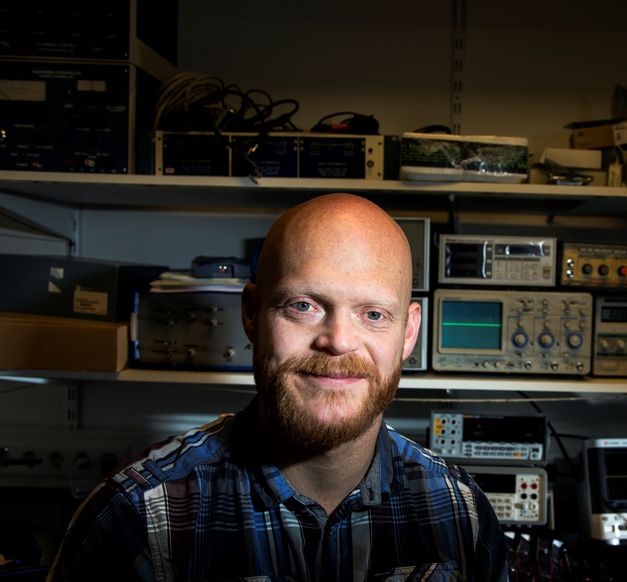Rúnar Unnþórsson, Senior Lecturer at the Faculty of Industrial Engineering, Mechanical Engineering and Computer Science
A lack of technological solutions that make it easier for blind and visually impaired people to take part in society was the inspiration for a large European research project, currently led by Rúnar Unnþórsson, Senior Lecturer in Industrial Engineering. The project received a grant of almost 600 million ISK from the European Union in 2015.
"The project is entitled 'Sound of Vision' and aims to develop high-tech equipment to make it easier for blind and visually impaired people to perceive their environments. The idea is not exactly new, but almost all older projects have been simple solutions that provide only rough information on the environment. The special thing about Sound of Vision is that it uses cameras and all the latest technology. The plan is that the equipment will scan the immediate environment in 3D and be able to detect the most important objects in the environment. Information about these objects in the environment will then become 3D models, which are translated into audio and vibration or touch. This will happen in real time," Rúnar explains.
Rúnar Unnþórsson
It is estimated that around 300 million people in the world have some kind of visual impairment, of whom around 40 million are blind. "A project like this could therefore improve quality of life for an extremely large group of people; there has been a lack of technological solutions for supporting increased participation of blind and visually impaired people in society,"

Rúnar first started thinking about solutions for blind and visually impaired people over a decade ago, but the idea did not gain momentum until 2013 when he made the acquaintance of engineers and computer scientists in Romania who were thinking along similar lines. The result was Sound of Vision, a joint project between universities and institutions in five European countries. As well as Rúnar, those involved in the project here in Iceland include representatives of the University of Iceland Faculty of Psychology (Professor Árni Kristjánsson, the postdoctoral researcher Ómar I. Jóhannesson and the MS student Vigdís Vala Valgeirsdóttir) and the Icelandic Organisation of the Visually Impaired.
Work for the first year and semesters focused mainly on testing and choosing between different technological solutions that will be used to further develop the project. "We have to test different methods of processing information from the data recorded by the cameras and also different methods of providing users with information on their environment in the form of 3D audio and vibration or touch. When this is complete, it will be possible to build a prototype of the Sound of Vision solution and test it," says Rúnar.
It is estimated that around 300 million people in the world have some kind of visual impairment, of whom around 40 million are blind. "A project like this could therefore improve quality of life for an extremely large group of people; there has been a lack of technological solutions for supporting increased participation of blind and visually impaired people in society," concludes Rúnar.


